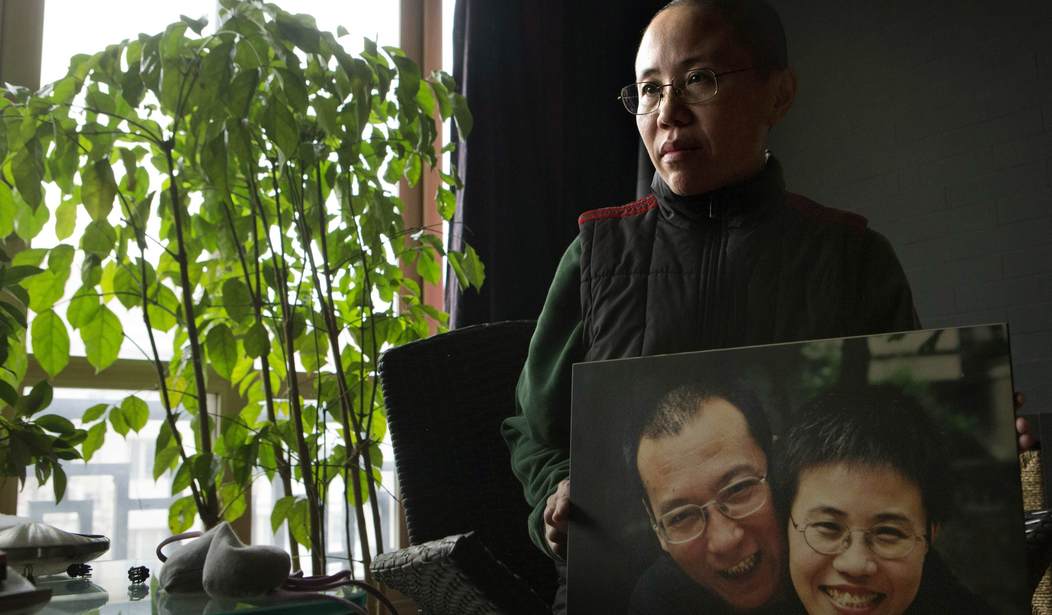China warned of “severe consequences” if a Senate bill renaming the street in front of the Chinese Embassy after a famous dissident becomes law.
Accordingly, President Obama is expected to acquiesce to the PRC and veto the bill — which would name the street after Liu Xiaobo, who was awarded the Nobel Peace Prize the year after Obama won it.
A bill by Rep. Mark Meadows (R-N.C.) to call the area between the intersections of International Drive Northwest and Van Ness Street Northwest and International Drive Northwest and International Place Northwest in Washington “Liu Xiaobo Plaza” is currently in the House Oversight and Government Reform Committee. The Senate version, introduced by Sen. Ted Cruz (R-Texas) and co-sponsored by Sens. Marco Rubio (R-Fla.) and Pat Toomey (R-Pa.), passed by voice vote last week.
Foreign Ministry Spokesperson Hong Lei told reporters Tuesday that the bill “violates the basic norms of international relations.”
“China firmly opposes that. If this bill is passed into law, it would cause severe consequences,” Hong said. “We urge the US Congress to stop the approval procedure of the bill. We also hope that the US administration can put an end to this political farce.”
The State Department was quick to reassure China while insisting they “continue to impress upon China the imperative of respecting human rights and releasing Liu Xiaobo as well as other political prisoners, obviously.”
But, spokesman Mark Toner said, the administration believes the bill isn’t “a very effective way to achieve either goal.”
“We view this kind of legislative action as something that only complicates our efforts, so we oppose this approach,” Toner said. “It’s our desire to work more productively and cooperatively with Congress on ways to address our shared goal of improving human rights in China.”
Asked if President Obama will veto the bill, Toner replied, “I think the White House has indicated that, yes.”
Liu was sentenced to 11 years in prison in 2009 for co-authoring Charter 08, a proposal to protect human rights and introduce democratic reforms. His wife, Liu Xia, has been under house arrest since he was awarded the Nobel in 2010.
On the fifth anniversary of Liu’s detention this past December, Rep. Chris Smith (R-N.J.) gathered Chinese human rights leaders together on the Hill, keeping a chair empty for Liu like there was in Oslo during the Nobel ceremony.
“China is in a race to the bottom with North Korea for the title of world’s worst violators of human rights,” said Smith, chairman of the U.S. Congressional-Executive Commission on China (CECC). “The hope that an economically prosperous and ‘rising China’ would embrace political reform and human rights has been destroyed. It is time for a new approach.”
“That the president, a fellow Nobel Laureate, has been reluctant to raise these cases in public — and link them to better U.S.-China relations — is certainly perceived as weakness by China’s leaders,” Smith added.
In advance of last year’s visit by President Xi Jinping, Smith and Rubio, who co-chairs the commission, led a #FreeChinaHeroes campaign.
“These cases are not mere statistics, rather they are professors and pastors, writers and lawyers whose ‘offenses’ are varied but whose plight is shared. While recognizing the broad scope of U.S-China bilateral relations, it is simply unconscionable for President Xi to get a pass on human rights,” Rubio said then. “We have an obligation to speak truth to power and demand their immediate and unconditional release.”









Join the conversation as a VIP Member